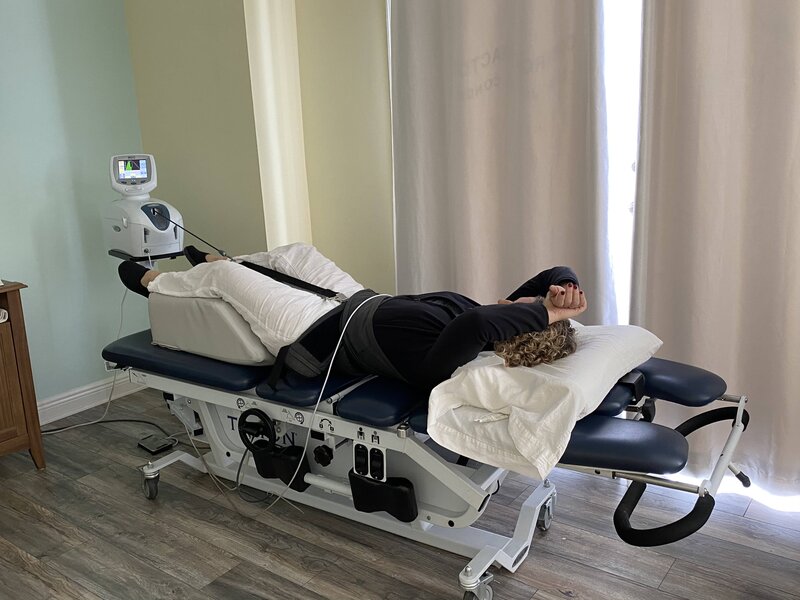Non-Surgical Spinal Decompression
Spinal decompression therapy in conjunction with additional modalities effectively relieves the pain and disability resulting from disc injury and degeneration, by repairing damaged discs and reversing dystrophic changes in nerves. Spinal decompression addresses the functional and mechanical aspects of discogenic pain and disease through non-surgical decompression of lumbar intervertebral discs. Studies verify the significant reduction of intradiscal pressures into the negative range, to approximately minus 150 mm/HG, which result in the non-surgical decompression of the disc and nerve root. Conventional traction has never demonstrated a reduction of intradiscal pressure to negative ranges; on the contrary – many traction devices actually increased intradiscal pressure, most likely due to reflex muscle spasm. The spinal decompression table is designed to apply distraction tension to the patient’s lumbar spine without eliciting reflex Para vertebral muscle contractions.

By significantly reducing intradiscal pressure, spinal decompression promotes retraction of the herniation into the disc and facilitates influx of oxygen, proline and other substrates. The promotion of fibro elastic activity stimulates repair and inhibits leakage of irritant sulphates and carboxylates from the nucleus. The most recent trial sought to correlate clinical success with MRI evidence of disc repair in the annulus, nucleus, facet joint and foramina as a result of treatment and found that reduction of disc herniation ranged between 10% and 90% depending on the number of sessions performed, while annulus patching and healing was evident in all cases.
The most recent clinical study of 219 patients has showed that spinal decompression therapy provided an immediate resolution of symptoms for 86% of the participants, while 84% remained pain-free 90 days post-treatment.
What Are The Treatments Like?
After lying on the comfortable spinal decompression bed, you will be fitted with an automatic shoulder support system. The automatic shoulder support system helps to stabilize your upper body. The advanced computer system automatically adjusts to the proper angle of distraction, an air bladder system acts as a fulcrum to the angle of pull, allowing us to target specific discs that are causing your pain and symptoms. The distractive forces utilize a logarithmic curve to avoid proprioceptive response, which would create muscle spasm. The split table design decreases friction and allows separation of the vertebrae, minimizing the effect of gravity.
Basically, you lay down and the spinal decompression computer simulates an anti-gravity effect on your back that helps herniated material return to its normal position and stop the pain. Patients describe the treatment as gentle, painless, intermittent pulling of your back. Many patients actually fall asleep during treatment!
How Long Are Treatments And How Many Do You Need?
Patients typically undergo 15 to 20 treatment sessions. Each treatment lasts between 30-45 minutes. This, of course, depends on your individual case and is determined by a thorough evaluation. Following each session, a cold pack and electric muscle stimulation may be applied to help pain relief and speed the healing process. It is important to note that many patients get substantial, immediate relief after just a few treatments. Some after just one! The really good news in? This is not something you have to continue to do for the rest of your life! So it is not a big commitment.
Non-surgical spinal decompression therapy is an effective treatment for:
• Herniated or bulging disc(s)
• Degenerative disc disease
• Facet syndrome
• Sciatica
• Post-surgical patients
• Spinal Stenosis